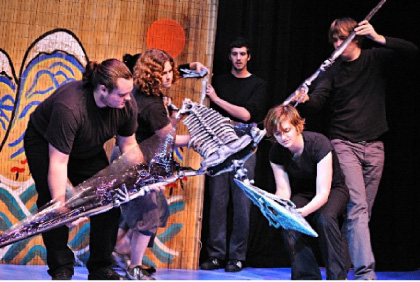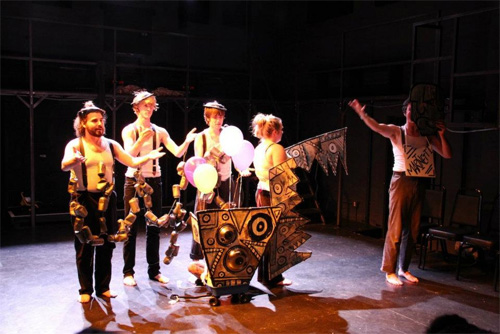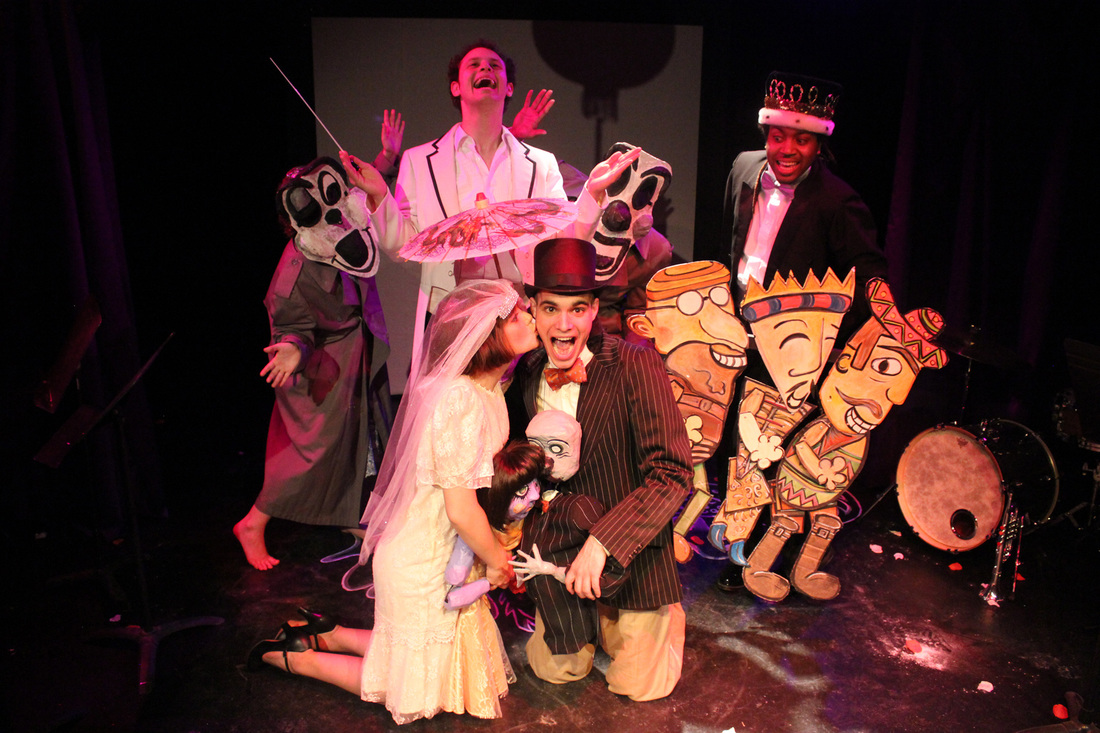|
Ahead of the 44 Plays for 44 Presidents event on Monday, October 29th, I had a chance to connect with Patricia Kalil, Co. Artistic Director of Pointless Theatre Co. Here's our conversation:
Jacqueline Lawton: How did your company form and how long have you been presenting work in D.C.? Patricia Kalil: Pointless Theatre was originally founded in the summer of 2009 by Patti Kalil and Matt Reckeweg as a group dedicated to performing innovative and exuberant puppet theatre. Formed mostly of University of Maryland-College Park theatre alumni, the company consists of less than twenty actors, designers and craftsmen, musicians and dancers who, together hope to redefine our own definitions of puppetry and theatre, while providing people with an eccentric yet charming night of entertainment. JL: What impact do you hope to make in the D.C. theatre community? PK: Every one of our productions to date has the end goal of successfully merging ensemble work among the actors with puppets and the vivid imagery of the stage design. Our company members strive to have no artistic boundaries or limitations. An ensemble approach to creating theatre through play and improvisation informs our work, and our performers’ boundless energy and intense commitment to their performances stems in part from this method of creating the piece. There is an overwhelming passion for the work we do within the Pointless family; it is intensely personal to all of us. We hope to charge our audiences with that passion and in doing so bring a new theatrical experience into the DC community. JL: Is political theatre important to you? PK: Pointless’ place in the art community is to provide its audiences with spectacular puppet shows, which can wow patrons of all ages and backgrounds. With that said, we cannot completely ignore politics in our shows and artwork when they do arise in conversation or concept. We may mock any sort of political controversy when presenting politicians’ often debauching attitude toward economic and social issues in the world. However, even with the occasional said mockery and political conviction on particularly topics, we tend to prioritize the richness in our storytelling and visual experimentation within productions. We hope to achieve a more enlightened theatre-going audience, convince people to make art not war and not take each other too seriously. At the end of the day we hope to unify people through our shows, and not further the divide among the various political ideologies we as individuals affiliate with. JL: Why did you decide to participate in 44 Plays for 44 Presidents? PK: We choose to participate in this production because of its ensemble and cooperative nature in performance style. Every Pointless show is created by the entire company, as we allow for directors, designers, actors, musicians and so on all get involved as writers. Structurally the creative team is always multi-layered, and cast members tend to add their own flare to the script as they see fit. We rarely choose to explore a show that has strong lead roles and instead opt for ensemble work to be the primary performative focus. We bring that philosophy to staff meeting as well as artistic discussions. The opportunity to work with other local DC theatre companies for a night of erratic political humor and sass seemed like the perfect combination of ensemble work and patriotic storytelling us Pointless kids could not resist. JL: Which president are you featuring? What’s his political affiliation and campaign slogan? PK: We will be presenting three presidents, including:
JL: What’s something interesting we should know about him? PK: In regards to:
JL: Did he support the arts while in office? If so, how? PK: They each did in different ways:
JL: If he was running for office this year, would you vote for him? Why or why not? PK: Yes for John Quincy Adams. He is known for being one of the most prominent abolitionists in American history, and he fought long and hard to promote anti-slavery sentiments and policies in the government. The preservation of the union was his priority, and he apparently was thrilled at the notion that southerners would indignantly call him an enemy of southern slavery as though this would offend him. No for Nixon, not only because of his shaky foreign policies that led to countless unnecessary deaths, but also because underneath that charming and attractive environmental policy record, we could never fully trust him. Besides his inexcusable behavior in political scandals such as Watergate, his disliking of modern art is quite frankly a deal breaker. Yes for Teddy Roosevelt, even if he didn’t approve of great modern. Unlike Nixon, we blame his poor taste in art on his old age and time period. The teddy bear was named after him supposedly because on a hunting trip, Roosevelt was given a bear cub to shoot by his crew and refused to kill the animal. When a toy maker Morris Michtom heard about the incident after various political cartoons spread the president’s new nickname regarding the incident, he developed the iconic children’s toy. We would vote for him because it is hard to resist the original, real-life teddy bear. JL: In addition to 44 Plays for 44 Presidents, what’s next for your company? PK: Our next production is an original puppet adaptation of the Canterbury Tales. Told through the eyes of a handful of drunkards in Middle English, this production of Geoffrey Chaucer’s stories emphasizes the inherently absurd and comic elements of these classic stories. Taking the aesthetic inspiration from old public houses and medieval taverns, the characters will be played by a mixture of puppets and actors. The combination of puppets, promiscuity, alcoholism and the Middle Ages becomes the perfect balance of drunken humor and storytelling. It will be presented as part of the 2012-2013 Mead Theatre Lab Program from CulturalDC, and performances run February 15th -March 9th. Check out www.PointlessTheatre.com for more information!
0 Comments
Your comment will be posted after it is approved.
Leave a Reply. |
My BlogI'm a playwright, dramaturg, and teaching artist. It is here where you'll find my queries and musings on life, theater and the world. My posts advocate for diversity, inclusion, and equity in the American Theatre and updates on my own work. Please enjoy!
Categories
All
Archives
June 2020
Reading List
|



